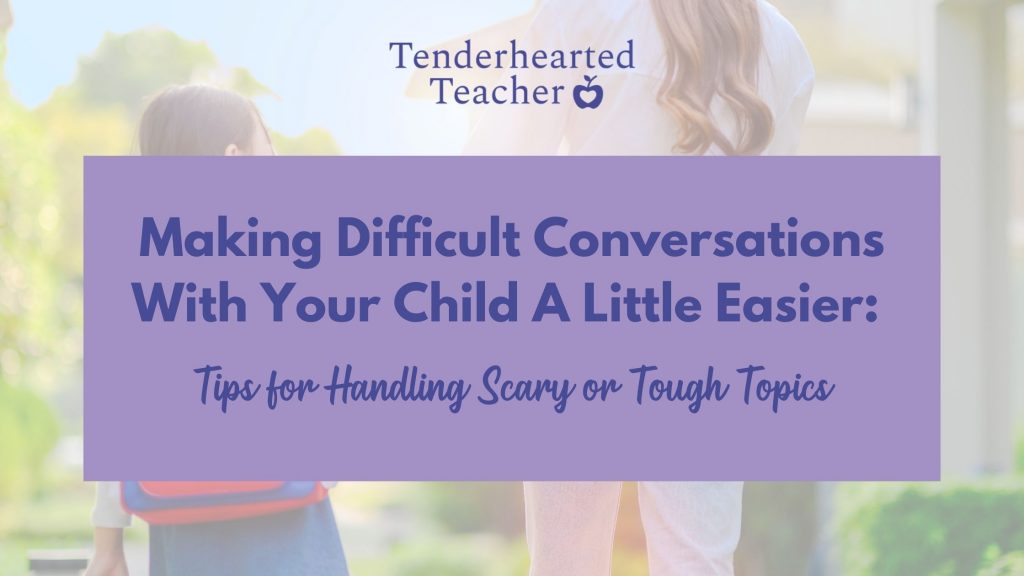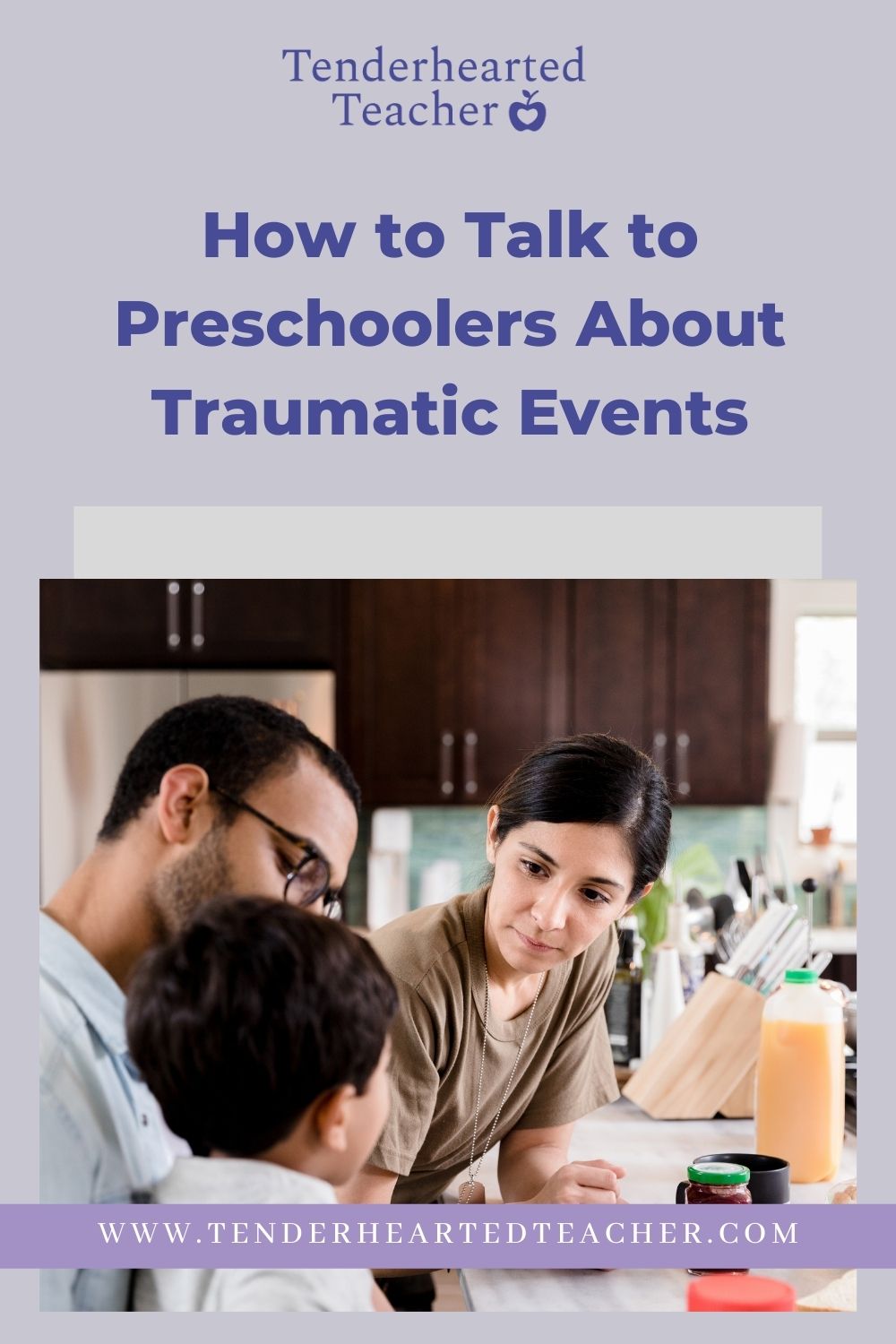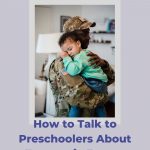
I had every intention of posting an article about the stages of early play development this week. But, I decided against it. Instead, I wanted to provide timely resources that may benefit caregivers and their little ones during scary and uncertain times. With that said, this post will share tips on how to talk to preschoolers about traumatic events.
The Importance of Talking with Kids About Trauma
There’s no way to sugar coat this. Our world can be a terrifying place. Humans consistently see war, gun violence, destruction, natural disasters, famine, disease, etc. These things can cause a well-adjusted adult to become overwhelmed with fear and anxiety. So, imagine how they can make our children feel. As caregivers we are responsible for comforting our children. We’re also tasked with guiding them in making sense of the world around them.
It may seem like a good idea to shield them from negative news (or to keep them in a bubble so to speak.) However, we can do more harm than good if we don’t approach these topics head-on (in an age-appropriate way, of course.)
Children are much smarter than they are given credit for. They have an awareness of what goes on around them (whether it’s happening in their immediate circle or throughout the world.) Therefore, if we don’t have these conversations with them at home they can become confused and fearful from the unknown or from potential misinformation–possibly causing adverse outcomes.
Ways to Talk to Your Preschooler About Traumatic Events
As an early childhood educator, I’ve had several instances in which my preschoolers have encountered negative situations in their own homes. For example, some of my students have faced divorce/separation, the death of a family member, illness, and/or financial insecurity, to name a few. I’ve also had students ask me questions because they are seeking information regarding world events that they’ve heard about on the news. In these situations, I always tell their caregivers that honest conversations with their little ones are critical in developing social-emotional skills and resilience. These talks not only help our children to understand what’s happening, but also to cope with traumatic news and circumstances.
The Substance Abuse and Mental Health Services Administration (SAMHSA) states that “adult support and reassurance is the key to helping children through a traumatic time.” They recommend giving preschool-aged children a lot of cuddling and verbal support after a traumatic event. They note that it’s important to get down to their eye level, use words they can understand, and to speak using a calm, gentle voice.
So What Exactly Do You Say To Your Child?


Since I am not a medical or mental health professional, I am basing my recommendations on advice from the American Psychological Association (APA), SAMHSA, and Education.com. Here are some things to remember when talking to children about difficult news:
1. Prepare in advance
Think about what you want to say beforehand and pick a quiet time and place so that you can answer your child’s questions in a calm environment.
2. Be an active listener
Ask them what they know, have heard, and what they are feeling about this news. Ask them if they have specific questions. If you don’t know the answer to something. Be honest. Tell them it’s something you need to find out and that you can look up the information together.
3. Validate their feelings and be open to sharing your own feelings
Tell them it is okay and natural to cry and/or feel scared, sad, or anxious after experiencing something like this. Caregivers can help children by encouraging opportunities to express themselves and their feelings through play as well as through writing, drawing, and dancing/singing. In addition, children’s books can be helpful in explaining difficult situations. (Check out the resources at the bottom of the page for more information.)
4. Use truthful, but age-appropriate language
It’s important to use straightforward language as to avoid confusion. Steer clear of using euphemisms. For example, if you are talking about the death of a loved one you should avoid saying “they passed away or they went to sleep.” Instead you may say, “This person died. When a person dies their body, brain, and heart no longer work anymore. This means we won’t be able to see or talk to this person again. It is okay to feel sad about this. We will miss them very much. We will always have our memories of them and we can talk about them together.”
5. Remain a calming presence
If your child is showing fear and anxiety, try your best to reassure them that they are safe, loved, and will have your continued support. For example, if your child sees images of a natural disaster that happened across the globe, they may become fearful that their home is in danger. To help alleviate their concerns you can show them a map and talk about where it occurred in relation to where you live.
6. Practice self-care and provide your child with opportunities to do the same
Limit your child’s (and your own) exposure to negative news and graphic images. Try to stick to your typical daily routine to provide your child with a sense of normalcy and consistency. Self-care is vital in times of need (like maintaining good eating and sleeping habits.) In addition, provide yourself and your little one with opportunities for exercise, physical activity, and/or participating in something you enjoy doing as a family such as going to the park or library.
7. Highlight the Positives and Contribute to Helpful Causes
There’s a famous quote by Fred Rogers (from the television show Mister Rogers’ Neighborhood) in which he states, “When I was a boy and I would see scary things in the news, my mother would say to me, ‘Look for the helpers. You will always find people who are helping.'”
During times of crisis you will, more often than not, find people who are helping others. Share these examples with your child. If it’s feasible for you and your family you can even find causes or charities in which you can volunteer your time and/or donate money or supplies.
8. Seek Professional Help If Necessary
Children react to trauma in different ways. But, it is possible for preschoolers to exhibit new behaviors like clinginess or fixation on negative news, changes in their eating and sleeping patterns, and/or regression to former behaviors such as thumb-sucking or bed-wetting. If you notice that these changes are long-lasting, I would encourage you to contact your doctor for additional support and guidance. There is no shame in seeking out professional help. Early interventions can produce positive outcomes as well as prevent long-term negative impacts.
Additional Resources for Talking about Trauma
- Sesame Street Communities: is one of my go-to websites for caregivers of young children. They share numerous resources, in both English and Spanish, about all things early childhood–including tough topics. The organization states, “Our videos, activities, printables, and digital interactives feature our friendly, furry Muppets and help you playfully, meaningfully engage with kids during everyday moments. The site covers a wide range of topics, from school readiness to building healthy habits to tough issues such as divorce and hunger.”
- Magination Press: is a publishing imprint of the APA. They provide children’s books about a variety of topics that can assist caregivers in broaching difficult subjects. The website states, “Our books reach young readers and their parents and caregivers to make navigating life’s challenges a little easier. It’s the combined power of psychology and literature that makes our books special. We publish a wide range of mental health topics, including anxiety, divorce, mindfulness, identity, death, depression, and much more.”
The biggest takeaway from all of this…our children need to know they aren’t alone during traumatic, scary, or uncertain times. They must be reminded that they are loved and that they can turn to their caregivers for comfort and support.
Now talk to me. Share your tips on how to talk to preschoolers about traumatic events. Please comment with your thoughts or ideas below.
More Blog Posts Related to Wellness in Preschool
- How to Praise Your Preschooler
- Simple Ways to Teach Your Preschooler About Gratitude
- Why Social-Emotional Learning Matters (Especially in Preschool)
REFERENCES: American Psychological Association. (2021, January 14). How to talk to children about difficult news. http://www.apa.org/topics/journalism-facts/talking-children Cleaver, S. (n.d.). 10 ways to talk to kids about events in the news. Education.com. Retrieved February 26, 2022, from https://www.education.com/slideshow/talk-kids-about-news/build-connection-world/ Substance Abuse and Mental Health Services Administration (SAMHSA). (2012, November). Tips for Talking With and Helping Children and Youth Cope After a Disaster or Traumatic Event: A Guide for Parents, Caregivers, and Teachers | SAMHSA Publications and Digital Products. Retrieved February 26, 2022, from https://store.samhsa.gov/product/tips-talking-helping-children-youth-cope-after-disaster-or-traumatic-event-guide-parents/sma12-4732
SAVE TO PINTEREST




Great tips to deal with traumatic events. Thanks!
I love your authenticity. Switching gears is a part of life. Thanks for sharing such an important resource.
This was really helpful and insightful. The difficult conversations are always the scariest, but like you said with a little care, validation and truth – we will all be better off by having those talks. Thank you for the additional resources too! There is always more to learn and ask.
So relevant and helpful with the tough events going on lately! Thanks for sharing
I have a 3 year old who is now starting to understand his world a little more so this is so helpful! Thanks for the information.
This is really helpful advice! It’s hard to know how to approach difficult topics with our little ones. These are some great suggestions
Sally, thank you for sharing these tips. It’s so important that we give our children the best support during chaotic times. Something I feel every home has endured in the last couple of years.
These are such wonderful tips. I’ll be saving this for later; you never know when you’ll need this information! Thanks for sharing!
This is really helpful advice!